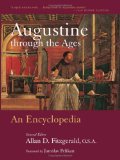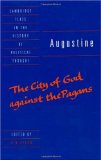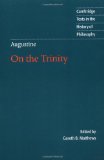|
Relevant
books
available at Amazon
Many Augustine
translations
and studies with links to Amazon
A selection below
 
Peter Brown biography
--------
 
Allan Fitzgerald --------
 
Henry Chadwick
a short indroduction --------
 
William Harmless.
Extracts from several of Augustine's main works --------
 
Henry Chadwick's translation of "Confessions" --------
 
R.W.Dyson's translation of "The City of God" --------
 
R.P.H. Green's translation of "On Christian Teaching" --------
 
Gareth Matthews' translation of "On The Trinity" (books 8 - 15) |
Chapter 1.—In What Way We Must Inquire Concerning the Trinity.
1. WE certainly seek a trinity,—not any trinity, but that Trinity which is God,
and the true and supreme and only God. Let my hearers then wait, for we are
still seeking. And no one justly finds fault with such a search, if at least he
who seeks that which either to know or to utter is most difficult, is steadfast
in the faith. But whosoever either sees or teaches better, finds fault quickly
and justly with any one who confidently affirms concerning it. “Seek God,” he
says, “and your heart shall live;” and lest any one should rashly rejoice that
he has, as it were, apprehended it, “Seek,” he says, “His face evermore.” And
the apostle: “If any man,” he says, “think that he knoweth anything, he knoweth
nothing yet as he ought to know. But if any man love God, the same is known of
Him.” He has not said, has known Him, which is dangerous presumption, but “is
known of Him.” So also in another place, when he had said, “But now after that
ye have known God:” immediately correcting himself, he says, “or rather are
known of God.” And above all in that other place, “Brethren,” he says, “I count
not myself to have apprehended: but this one thing I do, forgetting those things
which are behind, and reaching forth unto those things which are before, I press
in purpose toward the mark, for the prize of the high calling of God in Christ
Jesus. Let us therefore, as many as be perfect, be thus minded.” Perfection in
this life, he tells us, is nothing else than to forget those things which are
behind, and to reach forth and press in purpose toward those things which are
before. For he that seeks has the safest purpose, [who seeks] until that is
taken hold of whither we are tending, and for which we are reaching forth. But
that is the right purpose which starts from faith. For a certain faith is in
some way the starting-point of knowledge; but a certain knowledge will not be
made perfect, except after this life, when we shall see face to face. Let us
therefore be thus minded, so as to know that the disposition to seek the truth
is more safe than that which presumes things unknown to be known. Let us
therefore so seek as if we should find, and so find as if we were about to seek.
For “when a man hath done, then he beginneth.” Let us doubt without unbelief of
things to be believed; let us affirm without rashness of things to be
understood: authority must be held fast in the former, truth sought out in the
latter. As regards this question, then, let us believe that the Father, and the
Son, and the Holy Spirit is one God, the Creator and Ruler of the whole
creature; and that the Father is not the Son, nor the Holy Spirit either the
Father or the Son, but a trinity of persons mutually interrelated, and a unity
of an equal essence. And let us seek to understand this, praying for help from
Himself, whom we wish to understand; and as much as He grants, desiring to
explain what we understand with so much pious care and anxiety, that even if in
any case we say one thing for another, we may at least say nothing unworthy. As,
for the sake of example, if we say anything concerning the Father that does not
properly belong to the Father, or does belong to the Son, or to the Holy Spirit,
or to the Trinity itself; and if anything of the Son which does not properly
suit with the Son, or at all events which does suit with the Father, or with the
Holy Spirit, or with the Trinity; or if, again, anything concerning the Holy
Spirit, which is not fitly a property of the Holy Spirit, yet is not alien from
the Father, or from the Son, or from the one God the Trinity itself. Even as now
our wish is to see whether the Holy Spirit is properly that love which is most
excellent which if He is not, either the Father is love, or the Son, or the
Trinity itself; since we cannot withstand the most certain faith and weighty
authority of Scripture, saying, “God is love.” And yet we ought not to deviate
into profane error, so as to say anything of the Trinity which does not suit the
Creator, but rather the creature, or which is feigned outright by mere empty
thought.
Chapter 2.—The Three Things Which are Found in Love Must Be Considered.
2. And this being so, let us direct our attention to those three things which we
fancy we have found. We are not yet speaking of heavenly things, nor yet of God
the Father, and Son, and Holy Spirit, but of that inadequate image, which yet is
an image, that is, man; for our feeble mind perhaps can gaze upon this more
familiarly and more easily. Well then, when I, who make this inquiry, love
anything, there are three things concerned—myself, and that which I love, and
love itself. For I do not love love, except I love a lover; for there is no love
where nothing is loved. Therefore there are three things—he who loves, and that
which is loved, and love. But what if I love none except myself? Will there not
then be two things—that which I love, and love? For he who loves and that which
is loved are the same when any one loves himself; just as to love and to be
loved, in the same way, is the very same thing when any one loves himself. Since
the same thing is said, when it is said, he loves himself, and he is loved by
himself. For in that case to love and to be loved are not two different things:
just as he who loves and he who is loved are not two different persons. But yet,
even so, love and what is loved are still two things. For there is no love when
any one loves himself, except when love itself is loved. But it is one thing to
love one’s self, another to love one’s own love. For love is not loved, unless
as already loving something; since where nothing is loved there is no love.
Therefore there are two things when any one loves himself—love, and that which
is loved. For then he that loves and that which is loved are one. Whence it
seems that it does not follow that three things are to be understood wherever
love is. For let us put aside from the inquiry all the other many things of
which a man consists; and in order that we may discover clearly what we are now
seeking, as far as in such a subject is possible, let us treat of the mind
alone. The mind, then, when it loves itself, discloses two things—mind and love.
But what is to love one’s self, except to wish to help one’s self to the
enjoyment of self? And when any one wishes himself to be just as much as he is,
then the will is on a par with the mind, and the love is equal to him who loves.
And if love is a substance, it is certainly not body, but spirit; and the mind
also is not body, but spirit. Yet love and mind are not two spirits, but one
spirit; nor yet two essences, but one: and yet here are two things that are one,
he that loves and love; or, if you like so to put it, that which is loved and
love. And these two, indeed, are mutually said relatively. Since he who loves is
referred to love, and love to him who loves. For he who loves, loves with some
love, and love is the love of some one who loves. But mind and spirit are not
said relatively, but express essence. For mind and spirit do not exist because
the mind and spirit of some particular man exists. For if we subtract the body
from that which is man, which is so called with the conjunction of body, the
mind and spirit remain. But if we subtract him that loves, then there is no
love; and if we subtract love, then there is no one that loves. And therefore,
in so far as they are mutually referred to one another, they are two; but
whereas they are spoken in respect to themselves, each are spirit, and both
together also are one spirit; and each are mind, and both together one mind.
Where, then, is the trinity? Let us attend as much as we can, and let us invoke
the everlasting light, that He may illuminate our darkness, and that we may see
in ourselves, as much as we are permitted, the image of God.
Chapter 3.—The Image of the Trinity in the Mind of Man Who Knows Himself and
Loves Himself. The Mind Knows Itself Through Itself.
3. For the mind cannot love itself, except also it know itself; for how can it
love what it does not know? Or if any body says that the mind, from either
general or special knowledge, believes itself of such a character as it has by
experience found others to be and therefore loves itself, he speaks most
foolishly. For whence does a mind know another mind, if it does not know itself?
For the mind does not know other minds and not know itself, as the eye of the
body sees other eyes and does not see itself; for we see bodies through the eyes
of the body, because, unless we are looking into a mirror, we cannot refract and
reflect the rays into themselves which shine forth through those eyes, and touch
whatever we discern,—a subject, indeed, which is treated of most subtlely and
obscurely, until it be clearly demonstrated whether the fact be so, or whether
it be not. But whatever is the nature of the power by which we discern through
the eyes, certainly, whether it be rays or anything else, we cannot discern with
the eyes that power itself; but we inquire into it with the mind, and if
possible, understand even this with the mind. As the mind, then, itself gathers
the knowledge of corporeal things through the senses of the body, so of
incorporeal things through itself. Therefore it knows itself also through
itself, since it is incorporeal; for if it does not know itself, it does not
love itself.
Chapter 4.—The Three are One, and Also Equal, Viz The Mind Itself, and the
Love, and the Knowledge of It. That the Same Three Exist Substantially, and are
Predicated Relatively. That the Same Three are Inseparable. That the Same Three
are Not Joined and Commingled Like Parts, But that They are of One Essence, and
are Relatives.
4. But as there are two things (duo quædam), the mind and the love of it, when
it loves itself; so there are two things, the mind and the knowledge of it, when
it knows itself. Therefore the mind itself, and the love of it, and the
knowledge of it, are three things (tria quædam), and these three are one; and
when they are perfect they are equal. For if one loves himself less than as he
is,—as for example, suppose that the mind of a man only loves itself as much as
the body of a man ought to be loved, whereas the mind is more than the
body,—then it is in fault, and its love is not perfect. Again, if it loves
itself more than as it is,—as if, for instance, it loves itself as much as God
is to be loved, whereas the mind is incomparably less than God,—here also it is
exceedingly in fault, and its love of self is not perfect. But it is in fault
more perversely and wrongly still, when it loves the body as much as God is to
be loved. Also, if knowledge is less than that thing which is known, and which
can be fully known, then knowledge is not perfect; but if it is greater, then
the nature which knows is above that which is known, as the knowledge of the
body is greater than the body itself, which is known by that knowledge. For
knowledge is a kind of life in the reason of the knower, but the body is not
life; and any life is greater than any body, not in bulk, but in power. But when
the mind knows itself, its own knowledge does not rise above itself, because
itself knows, and itself is known. When, therefore, it knows itself entirely,
and no other thing with itself, then its knowledge is equal to itself; because
its knowledge is not from another nature, since it knows itself. And when it
perceives itself entirely, and nothing more, then it is neither less nor
greater. We said therefore rightly, that these three things, [mind, love, and
knowledge], when they are perfect, are by consequence equal.
5. Similar reasoning suggests to us, if indeed we can any way understand the
matter, that these things [i.e. love and knowledge] exist in the soul, and that,
being as it were involved in it, they are so evolved from it as to be perceived
and reckoned up substantially, or, so to say, essentially. Not as though in a
subject; as color, or shape, or any other quality or quantity, are in the body.
For anything of this [material] kind does not go beyond the subject in which it
is; for the color or shape of this particular body cannot be also those of
another body. But the mind can also love something besides itself, with that
love with which it loves itself. And further, the mind does not know itself
only, but also many other things. Wherefore love and knowledge are not contained
in the mind as in a subject, but these also exist substantially, as the mind
itself does; because, even if they are mutually predicated relatively, yet they
exist each severally in their own substance. Nor are they so mutually predicated
relatively as color and the colored subject are; so that color is in the colored
subject, but has not any proper substance in itself, since colored body is a
substance, but color is in a substance; but as two friends are also two men,
which are substances, while they are said to be men not relatively, but friends
relatively.
6. But, further, although one who loves or one who knows is a substance, and
knowledge is a substance, and love is a substance, but he that loves and love,
or, he that knows and knowledge, are spoken of relatively to each other, as are
friends: yet mind or spirit are not relatives, as neither are men relatives:
nevertheless he that loves and love, or he that knows and knowledge, cannot
exist separately from each other, as men can that are friends. Although it would
seem that friends, too, can be separated in body, not in mind, in as far as they
are friends: nay, it can even happen that a friend may even also begin to hate a
friend and on this account cease to be a friend while the other does not know
it, and still loves him. But if the love with which the mind loves itself ceases
to be, then the mind also will at the same time cease to love. Likewise, if the
knowledge by which the mind knows itself ceases to be, then the mind will also
at the same time cease to know itself. Just as the head of anything that has a
head is certainly a head, and they are predicated relatively to each other,
although they are also substances: for both a head is a body, and so is that
which has a head; and if there be no head, then neither will there be that which
has a head. Only these things can be separated from each other by cutting off,
those cannot.
7. And even if there are some bodies which cannot be wholly separated and
divided, yet they would not be bodies unless they consisted of their own proper
parts. A part then is predicated relatively to a whole, since every part is a
part of some whole, and a whole is a whole by having all its parts. But since
both part and whole are bodies, these things are not only predicated relatively,
but exist also substantially. Perhaps, then, the mind is a whole, and the love
with which it loves itself, and the knowledge with which it knows itself, are as
it were its parts, of which two parts that whole consists. Or are there three
equal parts which make up the one whole? But no part embraces the whole, of
which it is a part; whereas, when the mind knows itself as a whole, that is,
knows itself perfectly, then the knowledge of it extends through the whole of
it; and when it loves itself perfectly, then it loves itself as a whole, and the
love of it extends through the whole of it. Is it, then, as one drink is made
from wine and water and honey, and each single part extends through the whole,
and yet they are three things (for there is no part of the drink which does not
contain these three things; for they are not joined as if they were water and
oil, but are entirely commingled: and they are all substances, and the whole of
that liquor which is composed of the three is one substance),—is it, I say, in
some such way as this we are to think these three to be together, mind, love,
and knowledge? But water, wine, and honey are not of one substance, although one
substance results in the drink made from the commingling of them. And I cannot
see how those other three are not of the same substance, since the mind itself
loves itself, and itself knows itself; and these three so exist, as that the
mind is neither loved nor known by any other thing at all. These three,
therefore, must needs be of one and the same essence; and for that reason, if
they were confounded together as it were by a commingling, they could not be in
any way three, neither could they be mutually referred to each other. Just as if
you were to make from one and the same gold three similar rings, although
connected with each other, they are mutually referred to each other, because
they are similar. For everything similar is similar to something, and there is a
trinity of rings, and one gold. But if they are blended with each other, and
each mingled with the other through the whole of their own bulk, then that
trinity will fall through, and it will not exist at all; and not only will it be
called one gold, as it was called in the case of those three rings, but now it
will not be called three things of gold at all.
Chapter 5.—That These Three are Several in Themselves, and Mutually All in
All.
8. But in these three, when the mind knows itself and loves itself, there
remains a trinity: mind, love, knowledge; and this trinity is not confounded
together by any commingling: although they are each severally in themselves and
mutually all in all, or each severally in each two, or each two in each.
Therefore all are in all. For certainly the mind is in itself, since it is
called mind in respect to itself: although it is said to be knowing, or known,
or knowable, relatively to its own knowledge; and although also as loving, and
loved, or lovable, it is referred to love, by which it loves itself. And
knowledge, although it is referred to the mind that knows or is known,
nevertheless is also predicated both as known and knowing in respect to itself:
for the knowledge by which the mind knows itself is not unknown to itself. And
although love is referred to the mind that loves, whose love it is; nevertheless
it is also love in respect to itself, so as to exist also in itself: since love
too is loved, yet cannot be loved with anything except with love, that is with
itself. So these things are severally in themselves. But so are they in each
other; because both the mind that loves is in love, and love is in the knowledge
of him that loves, and knowledge is in the mind that knows. And each severally
is in like manner in each two, because the mind which knows and loves itself, is
in its own love and knowledge: and the love of the mind that loves and knows
itself, is in the mind and in its knowledge: and the knowledge of the mind that
knows and loves itself is in the mind and in its love, because it loves itself
that knows, and knows itself that loves. And hence also each two is in each
severally, since the mind which knows and loves itself, is together with its own
knowledge in love, and together with its own love in knowledge; and love too
itself and knowledge are together in the mind, which loves and knows itself. But
in what way all are in all, we have already shown above; since the mind loves
itself as a whole, and knows itself as a whole, and knows its own love wholly,
and loves its own knowledge wholly, when these three things are perfect in
respect to themselves. Therefore these three things are marvellously inseparable
from each other, and yet each of them is severally a substance, and all together
are one substance or essence, whilst they are mutually predicated relatively.
|

